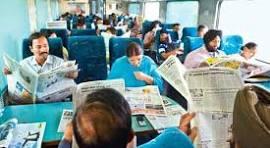
We cannot think of a world without newspapers. This is especially true in the case of the modern educated man, who cannot enjoy his morning breakfast unless he has the morning’s paper before him either in print or in digital form.
The world moves so fast, events happen so quickly in every sphere of life that keeping in close touch with the latest developments has become a pre-requisite for success. One must be posted up-to-date if one desires to make any progress in life.
The primary function of a newspaper, as the very name suggests, is to provide news of all kinds. The statesman is anxious to know the latest developments in the political sphere, the businessman wants correct information about market conditions, common man has natural curiosity to learn about almost everything in general. A successful newspaper caters to all kinds of readers – scientists, sportsmen, cinema-fans, politicians, businessmen, lawyers and jobless workers anxiously looking up advertisement columns.
Besides their informative character, newspapers possess a literary value. Articles by well-known writers, commentary by experts, book reviews by able critics, all find their way into newspapers. It is a fact that in addition to the news, which has only a passing interest for us newspapers contain useful content of a permanent and lasting value.
Newspapers are a very powerful means of propaganda. They form and mould public opinion. The editorials or leading articles in a newspaper have much effect on its readers who tend to form their opinions in accordance with the ideas expressed there. It is newspapers that enable us to form judgements upon situations or incidents of national importance.
Further, newspapers serve as a mirror of public opinion because the public can express its views in letters to the editor, which are published in the newspapers. The leaders of a country again can convey their message to the people. In this way, newspapers create direct contact between the nation and its leaders. The educative value of newspapers is thus very great.
Newspapers provide a great opportunity to business. Businessmen can advertise their goods in newspapers and thus reach their customers. Besides these, newspapers contain several other advertisements which serve a useful purpose. They are a means of bringing together buyers and sellers, employers and workmen, lost children and those searching for them. Matrimonial notices, situation wanted, situation vacant and a score of other categories of advertisements appear in the pages of modern newspaper to make it more useful and interesting.
At the same time, newspapers can do great harm. Indeed, the press in India does not sufficiently recognize its duties and responsibilities. Some newspapers lower their moral tone in order to appeal to the loose sentiments of the readers. Again, there are communal papers, which are a threat to the unity of India. They were mainly responsible for the partition of the country in 1947 and to many communal clashes after independence. Some newspapers do not publish the truth but half-truths. Such newspapers pose great danger to the fabric of communal harmony.
The press has a sacred responsibility. This consists in verifying the truth of every item of news that is published and making impartial and dispassionate comments upon the various happenings in the world. A newspaper should not serve a political party, a group of people, but the whole nation. The emergence of monopoly in this field is also undesirable.
Now, newspapers are facing real threat to their survival because news is available instantly and at finger tips in the ultra new technological devices. Internet is penetrating every corner of the world and through the internet news is now available in mobile phones, smart phones, tablet-computers and laptops. And, the news available through these modes is either free or the cost is much less than the printed newspapers. As a result, many famous newspapers have stopped their publication.
Therefore, the newspapers have to realize their role and play their role more effectively. They have hailed as “the guardians of liberty”. The liberty of the press has been described as the foundation of all the civil, political and religious rights of the citizens. The press has been called as the fourth pillar of democracy. It can be the beacon-light of truth and justice, if it performs as independent and transparent media. On the contrary, if the press becomes a tool of a political party or the government, it loses it credibility.
